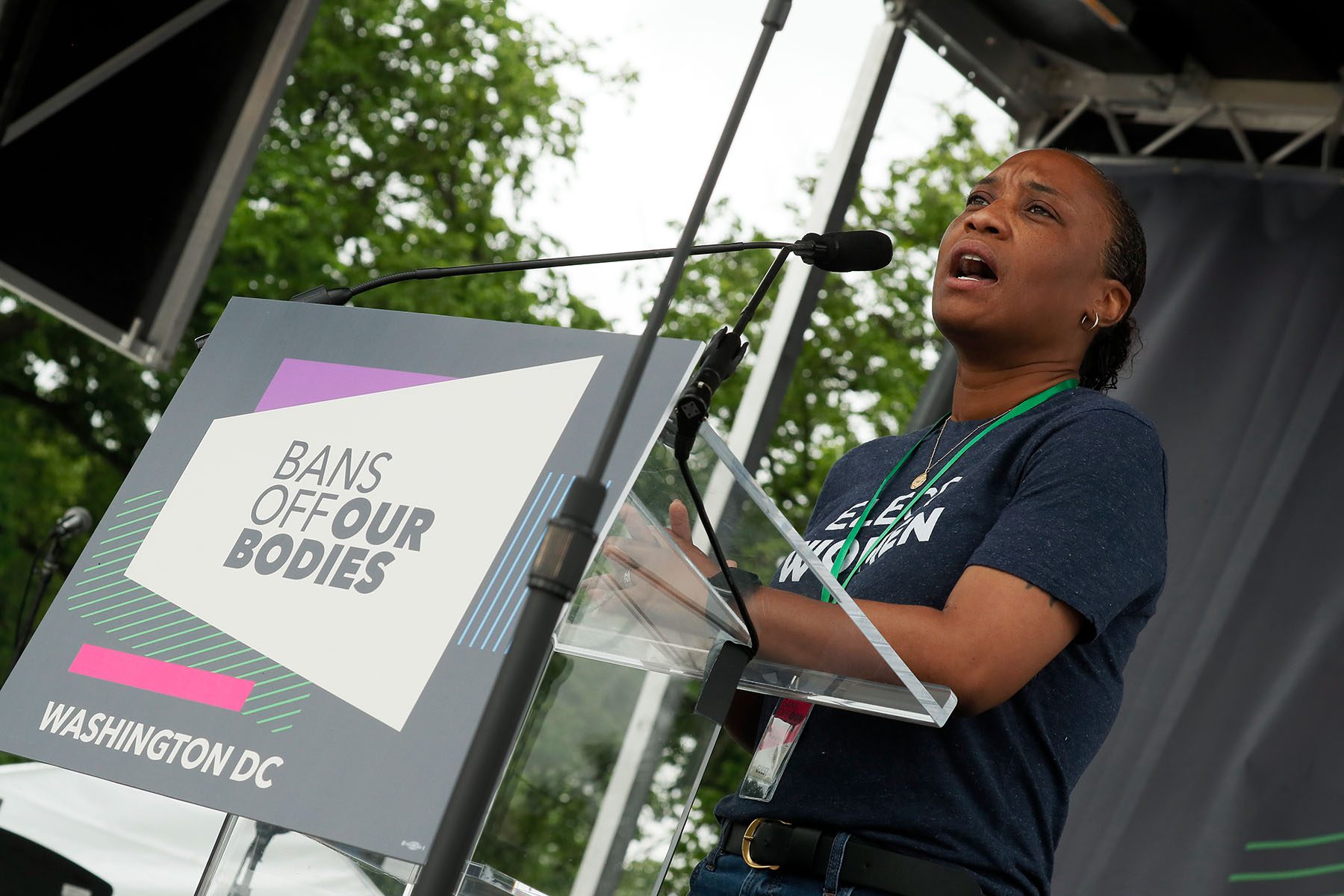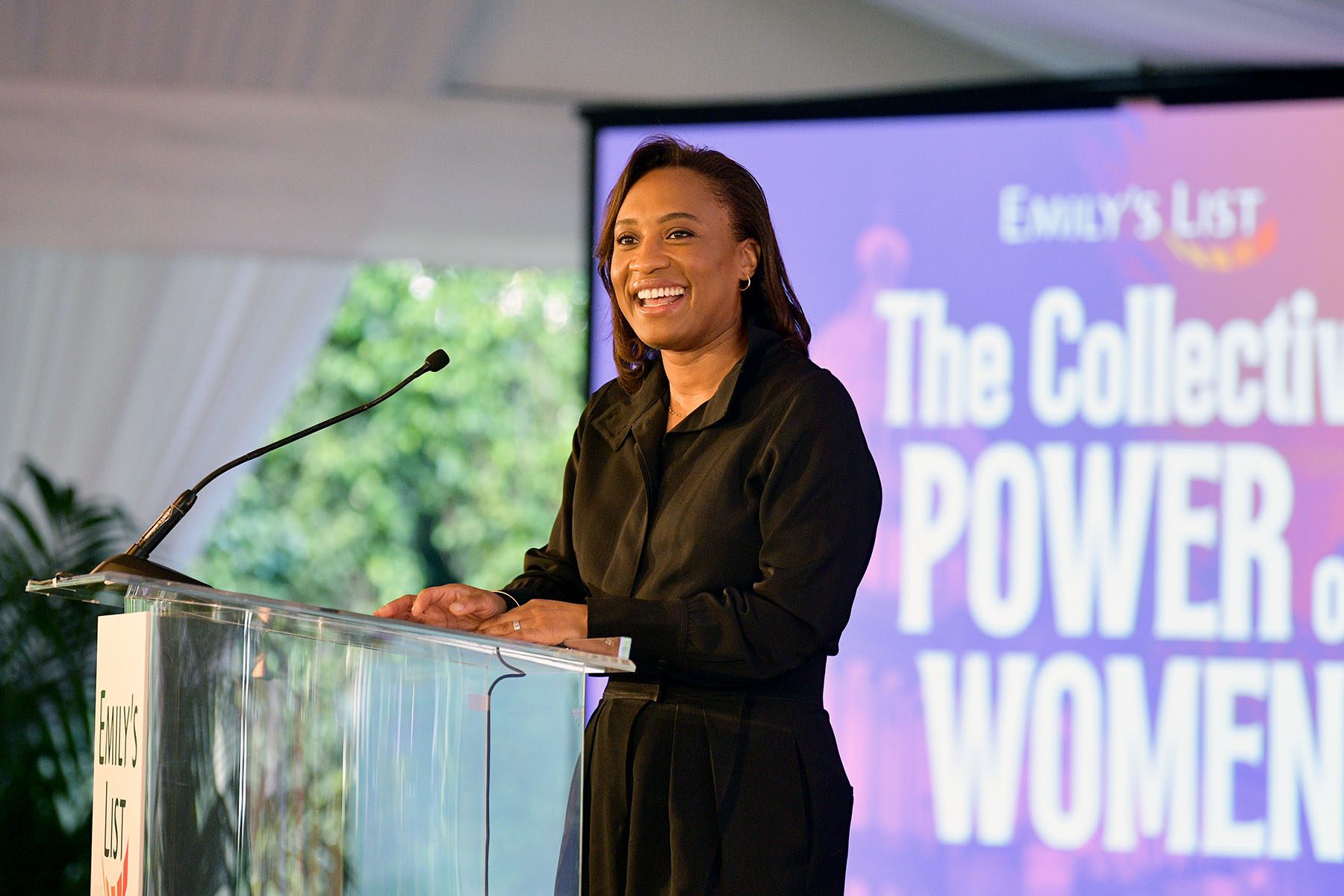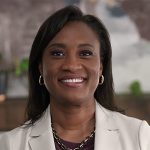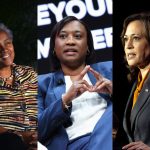Editor’s note: This story is from August 2022; read about expected interim Senate appointment here.
Emily’s List, which backs Democratic women who support abortion rights as they run for office, is rebranding – a move that includes an expanded focus on voting rights and endorsing a more diverse roster of candidates.
The shift in messaging and representation comes as the organization’s first Black woman president, Laphonza Butler, prepares to mark a year at the helm. The veteran organizer, union labor leader, mother and graduate of a historically Black college is reaching out to new donors and candidates, speaking at events where she will reach prominent Black women, and adding a focus on issues like voting rights that she sees as key to the mission of Emily’s List.
The moves come in the wake of the Supreme Court’s June 24 decision that left the legality of abortion up to the states, and as a record number of women of color are running for and winning elected office.
Butler told The 19th that after 37 years of electing Democratic, pro-choice women, the question for the organization’s next era is: To do what?
“For every election cycle, we have been the proverbial backbone as voters of the Democratic Party, and we’re running for office not just to be at the table, but to change the whole conversation that’s happening,” Butler said. “The rebrand is a way I want to bring the completion to that sentence, that yes, we want women to run and we want to help them win, but ultimately what this country wants and what the Democratic Party has to be about is to do something — and that is to bring about change.”
With 70 days to go before Election Day, the group is introducing a new logo that incorporates a flag and a checkmark, as a nod to voting rights, and a new tagline, “Run. Win. Change the World.” A general election tour kicks off Wednesday in New Hampshire, where Butler will campaign with Sen. Maggie Hassan ahead of the state’s primary election on September 13. Hassan, who does not face serious primary competition, is one of the more endangered Senate Democratic incumbents.
-
More from The 19th
- The midterms, a milestone and the myth of the monolith: How 2022 could build on women’s representation
- ‘We need your help’: Election officials ask Congress to better address harassment ahead of midterms
- Kamala Harris wants to be seen — and let voters know she sees them. Can it work?
The issue of abortion has gained prominence with voters in the weeks since the Supreme Court’s decision in Dobbs vs. Jackson Women’s Health Organization, and women-led groups are seeking to capitalize on the momentum. The Emily’s List tour will hit other states with competitive races, including Michigan, Colorado, Georgia, Arizona, Oregon and North Carolina. Planned Parenthood is focusing its midterm efforts in Arizona, Georgia, Michigan, Minnesota, New Hampshire, North Carolina, Pennsylvania and Wisconsin. Planned Parenthood Action Fund has already said it would spend $50 million on the 2022 midterms; Emily’s List said it is partnering with Planned Parenthood and NARAL to raise and spend a historic $150 million on the 2022 midterms. Emily’s List alone spent $112 million in the 2020 cycle, when there was a presidential election; the group said it’s too early to know how much it is spending this year.
Susan B. Anthony Pro-Life America, formerly SBA List, which supports candidates who oppose abortion rights, says its organization and its affiliates plan to spend $78 million during the midterms and to contact 8 million voters ahead of Election Day.
A year ago, Butler predicted abortion would be a “winning issue” for Democrats in 2022, but added in her interview this week that the pitch to voters by the party and by groups like hers would need to be more holistic.
“We are committed to being a dedicated resource to ensure that we are protecting access to reproductive health care, but the only way for us to protect those rights is if we have free and fair access to the ballot,” said Butler. “If we can’t elect the people who represent our values, then they can’t govern based on our values.”
Many of the same states that are restricting abortion in the wake of the Dobbs ruling have also added new rules around elections that limit how people can vote or, in some cases, potentially make the running and certification of elections more partisan.
In an open letter to supporters, Butler wrote: “Right now, it’s our turn to recognize the inextricable linkage between reproductive health, economic justice, civil rights, voting rights and climate justice. We must connect the advocacy movements that are fighting for our rights, because we build power by working together to achieve our goals.”
Midterm voters “are not single-issue people,” Butler said in the interview.
“They have whole lives, and they want candidates that have a core set of values that really speak to the kind of change they want to see in their communities and across the country,” Butler said.
“Yes, abortion access is one thing that is top of mind for them and will always be critical to who Emily’s Lits endorses, but we have to make sure they are able to speak to the whole voter,” she continued. “Is that a shift for Emily’s List? Probably, but what I know is that is what I have seen to be most effective.”

Butler has also made some stops on the campaign trail that were new or higher profile for Emily’s List, where White women were long seen as the main leaders and beneficiaries of the group’s largesse and influence. Earlier this month, she spoke at an Emily’s List event at Martha’s Vineyard during the high season for prominent African American vacationers. The group upped its presence at this year’s Essence Fest and has engaged with historically Black colleges and Black sororities, recently convening women leaders at Morehouse School of Medicine in Atlanta. Butler will attend a prominent gathering of Black women leaders in politics, business, media and labor in the city next month.
“We have been in a lot more places than we had been in the past,” Butler said. “I am intentionally trying to communicate that Emily’s List is an organization that is accessible to every woman that wants to serve in public office.”
Butler noted that in the past year, she has heard from women of color who had not been asked to support Emily’s List in the past and from candidates who never thought they would get an endorsement from the organization.
“There have been lots of responses of surprise, of excitement, but most importantly, the response has been that more people want us to come,” she said.
Butler is among a number of women of color who have recently taken top roles at organizations historically run by White women. That includes Planned Parenthood CEO and President Alexis McGill Johnson, NARAL Pro-Choice America President Mini Timmaraju and National Women’s Law Center President Fatima Goss Graves. Emily’s List has endorsed 34 women of color this cycle and said more endorsements will come. The group backed 28 women of color in 2020, 29 in 2018 and 18 in 2016. The rise is also a reflection of the increasing number of Black women who are running for and winning positions to elected office.
On the group’s website, the featured candidates on the homepage are all Black women who would be the first in their roles if elected: U.S. Senate candidates Val Demings of Florida and Cheri Beasley of North Carolina and Georgia gubernatorial candidate Stacey Abrams.
Butler said highlighting women candidates of color in particular is about expanding Emily’s List’s core mission of what it means and who can be a viable candidate. (The organization’s name is an acronym that stands for “Early Money Is Like Yeast.”)
“It actually means something, and the more that we’re able to manifest the meaning on behalf of women all over this country is an important part of how I continue the legacy of this organization,” said Butler, who added that the group is continuing to endorse candidates at the federal, state and local level. “I have to remind people that Emily is not a person.”
Maya Harris, sister to Vice President Kamala Harris, joined the Emily’s List board in 2020. Half of the members of the board, including its chair, are women of color. She said Butler is bringing in people who had not previously seen themselves in the organization.
“You do want to have people who have been too often left out, to be not just let in, but be at the table,” Harris said. “Laphonza gets that. She spent her career working on the ground, to build coalitions and bridges that actually build real power.”
Correction: An earlier version of this article incorrectly stated that Butler spoke at Essence Fest.








